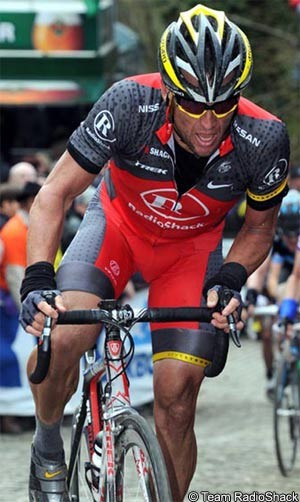Progress being made in case
 With the investigation into alleged doping accelerating in scope and apparently nearing a conclusion, Lance Armstrong’s spokesman has again complained that the process is a waste of money.
With the investigation into alleged doping accelerating in scope and apparently nearing a conclusion, Lance Armstrong’s spokesman has again complained that the process is a waste of money.
“American taxpayer money is being squandered on a European trip for FDA investigators to dredge up old allegations that have already been thoroughly examined and completely discredited,” said Mark Fabiani, according to the Associated Press.
“All of Lance’s samples were clean when they were first provided and tested, and no amount of tax-money-wasting European meetings can change that fundamental fact.”
The dismissal of the enquiry contrasts with a statement by former federal prosecutor Mathew Rosengart, who told AP that indications were that something significant was taking place.
He spoke about the trip to Europe by federal investigator Jeff Novitzky, federal prosecutor Doug Miller, his co-counsel Mark Williams, FBI special agent Olivier Faraole and US Anti-Doping Agency chief Travis Tygart, saying that the fact that they had travelled to have talks with French, Italian and Belgian officals suggested that the matter was more substantial than some are claiming.
Rosengart, who is not involved in the case, said that he believed the trip to France, “signals that the government is very serious about the investigation and it’s much more than a pro forma investigation.”
“The Justice Department would not ordinarily spend the type of time and money without an extreme seriousness of purpose,” he said. “It just shows they’re turning over every rock looking for every piece of evidence.”
Novitzky and the others are responding to claims made against Armstrong and others on the US Postal Service team, started by Floyd Landis earlier this year and reportedly substantiated by others, including former team-mates of the rider.
The Americans flew to Europe earlier this week and met with officials from the French Anti Doping Agency AFLD, the French police, Italian anti-doping prosecutor Benedetto Roberti, Italian police from Padua and Florence, and Belgian police and magistrates. The meetings were held in Interpol’s headquarters in Lyon, and were described as very productive.
Investigation is ‘no joke’:
One European participant, who asked not to be named, said he was surprised to see at least half a dozen American officials when he was brought to a conference room to speak with them. He said that he told himself, “this is no joke. This is serious, this is hard-nose. It was not a sightseeing trip.”
Another participant referred to Novitzky’s past when working on the Balco case, specifically the federal investigator’s decision to shift through rubbish connected to the lab in order to find important evidence. “He’s going through all of Europe’s trash cans. And sometimes you find things in a trash can,” he told AP. “They need supplemental proof to back up everything they have gathered.”
He said that a lot of information had been gathered and that the case being built appeared to be a significant one. “As we say in our jargon, they have some marbles to play with,” he stated.
Roberti ordered a raid last week on the home of Armstrong’s RadioShack team-mate Yaroslav Popovych, saying that it was done in connection with the American investigation and that the Ukrainian’s laptop and phone were being analysed for information.
He previously sent a delegate to meet the Americans in July, and said this week that that the process was part of a larger fight against doping in sport.
“We realized that we have reciprocal interest in this fight, and hopefully time will confirm that,” he said. “We need to exchange information, because this phenomenon can’t be beaten alone. Everyone needs to contribute. This battle can’t be won in the media.”
That’s something that Fabiani will be well aware of. He’s told the press on several occasions that the investigation should be abandoned to save money, but this has been ignored by the federal investigators. They are convinced that there is a basis for the work being done, and the international cooperation plus recent statements suggests that progress is being made.
One thing is certain: if hard evidence is indeed uncovered, the cost of the investigation will not be a sufficient defence.